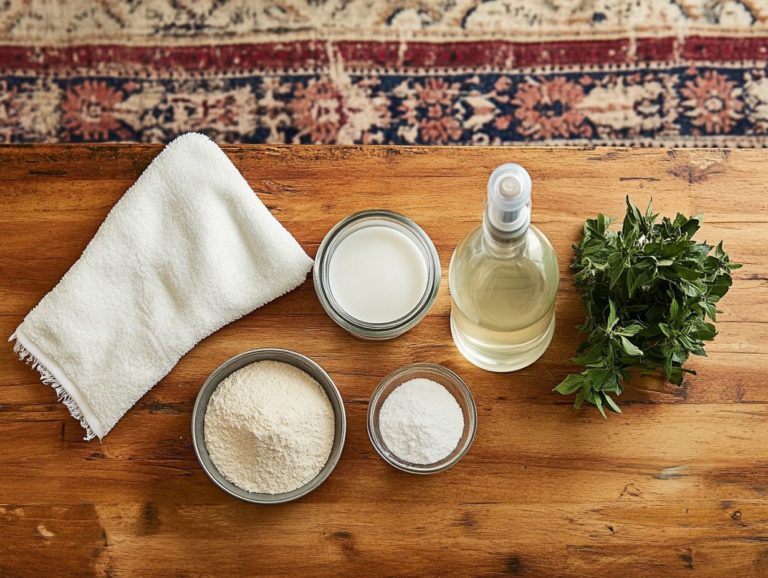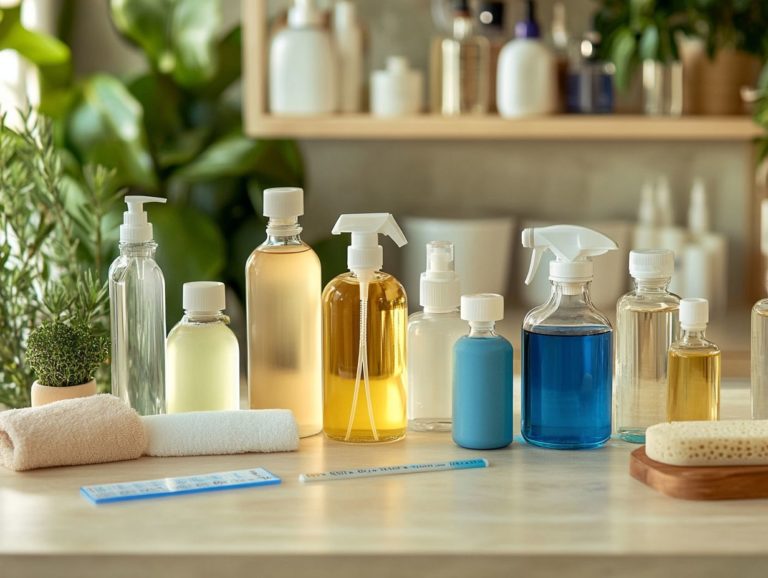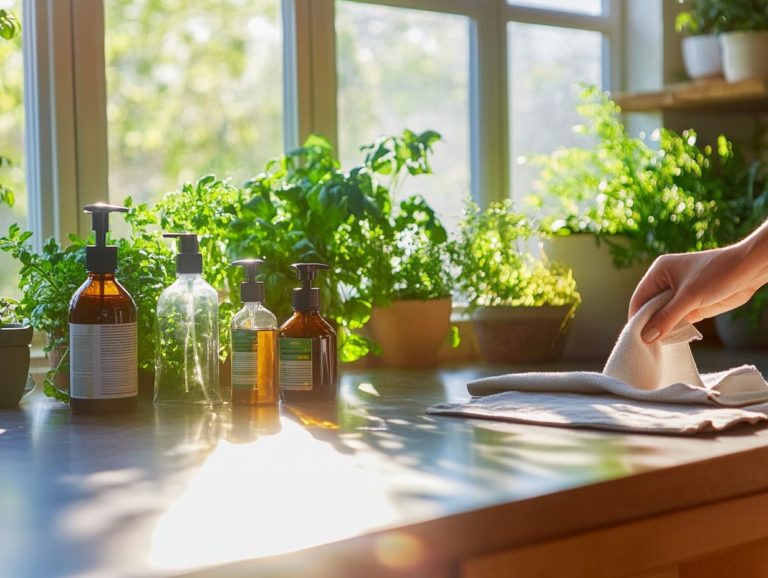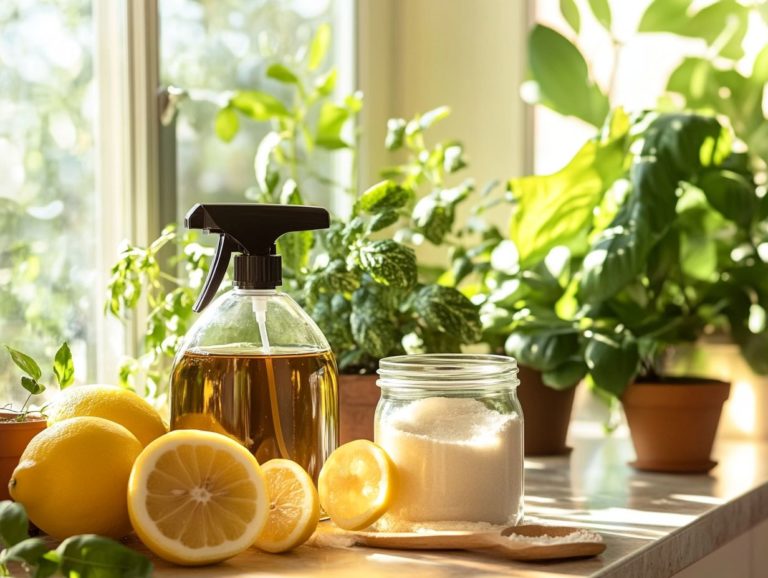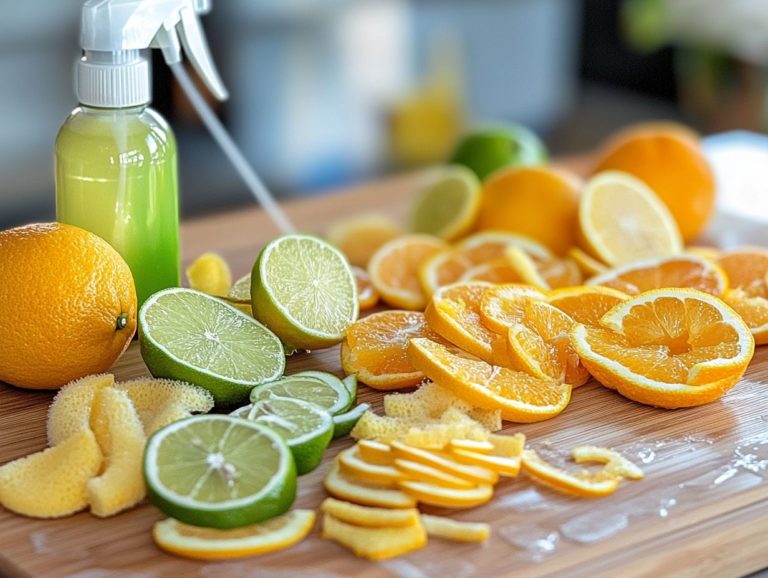6 Tips for Choosing Eco-Friendly Cleaning Supplies
As awareness of environmental issues increases, you may find yourself reassessing your cleaning choices. Traditional cleaning products often contain harmful chemicals that can impact both your health and the planet’s well-being.
This article delves into six essential tips for selecting eco-friendly cleaning supplies. From recognizing biodegradable ingredients and ingredients that help to break down dirt and grease to choosing recyclable packaging, it offers valuable guidance on making more sustainable decisions.
Uncover the myriad benefits of eco-friendly products, including those with the Safer Choice and DfE labels, and discover straightforward recipes for crafting your own natural cleaning solutions!
Contents
- Exciting Key Takeaways for a Cleaner Planet!
- 1. Look for Biodegradable and Non-Toxic Ingredients
- 2. Choose Products with Recyclable Packaging
- 3. Avoid Harsh Chemicals and Artificial Fragrances
- 4. Opt for Concentrated Products to Reduce Waste
- 5. Research the Company’s Environmental Practices
- 6. Consider Making Your Own Cleaning Solutions
- Why Should You Switch to Eco-Friendly Cleaning Supplies?
- What Are the Harmful Effects of Traditional Cleaning Products?
- What Are the Benefits of Using Eco-Friendly Cleaning Supplies?
- How Can You Tell If a Product Is Truly Eco-Friendly?
- What Are the Most Common Eco-Friendly Ingredients in Cleaning Products?
- How Can You Make Your Own Cleaning Solutions Using Natural Ingredients?
- Frequently Asked Questions
- What are eco-friendly cleaning supplies?
- Why should I choose eco-friendly cleaning supplies?
- What are the benefits of using eco-friendly cleaning supplies?
- How can I identify eco-friendly cleaning supplies?
- What should I avoid when choosing eco-friendly cleaning supplies?
- Where can I find eco-friendly cleaning supplies?
Exciting Key Takeaways for a Cleaner Planet!
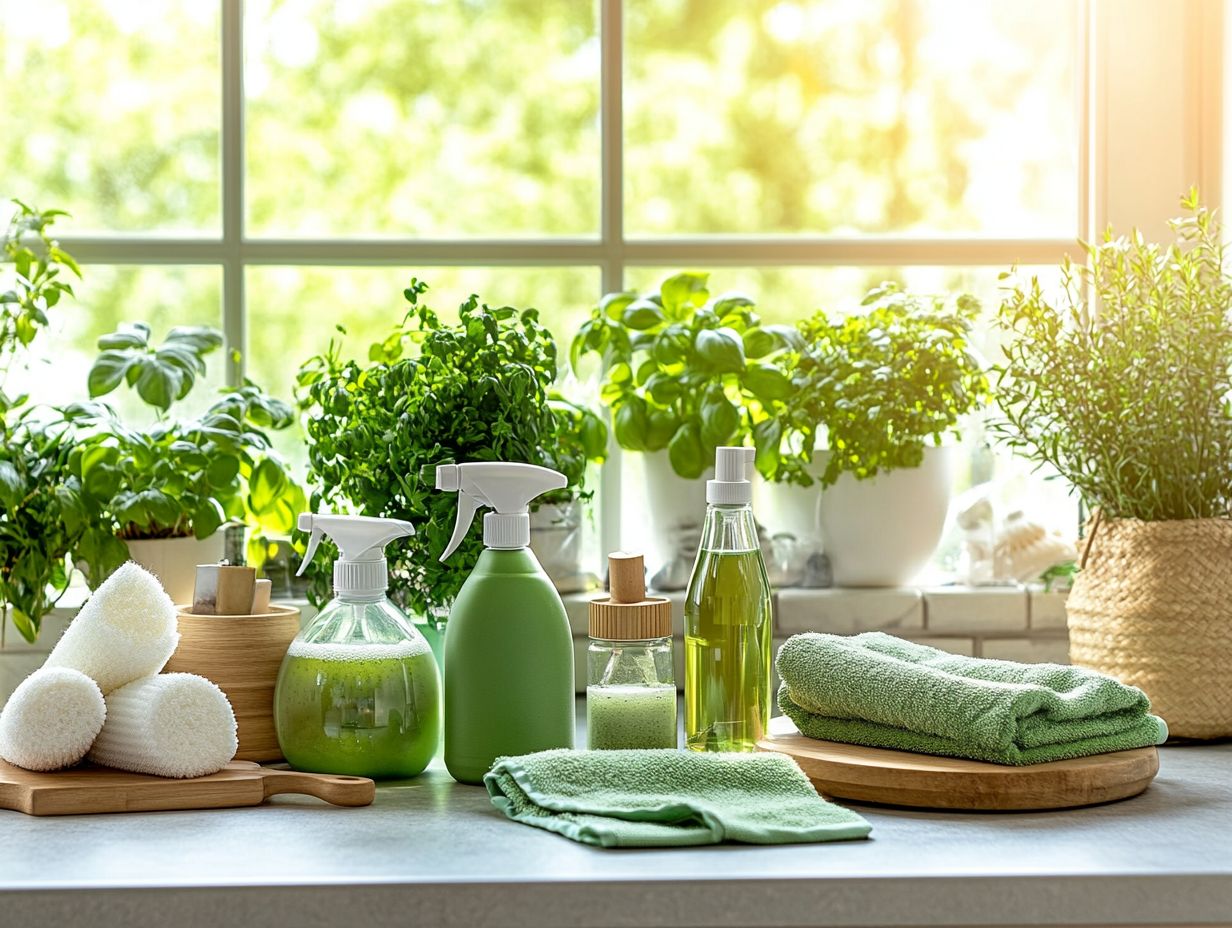
- Choose biodegradable and non-toxic ingredients to protect the environment and your health.
- Opt for products with recyclable packaging to reduce waste and promote sustainability, utilizing renewable resources.
- Avoid harsh chemicals and artificial fragrances to create a healthier living space and reduce air pollution, thereby improving indoor air quality.
1. Look for Biodegradable and Non-Toxic Ingredients
When selecting cleaning products, seek biodegradable and non-toxic ingredients. Eco-labels are also important for your health and the planet.
Biodegradable ingredients break down naturally, significantly reducing pollution. Non-toxic components help mitigate health risks linked to chemical exposure. By choosing cleaners that utilize plant-based compounds, you ll discover effective antimicrobial products that not only eradicate germs but also leave behind no harmful residues.
Brands like Meliora Cleaning Products and No Tox Life lead the way, offering a variety of items that prioritize these safer ingredients. Opting for such products can have a profound impact on your health, especially if you have sensitivities or respiratory concerns, all while addressing broader environmental issues by decreasing the chemical burden on ecosystems.
Embracing this mindful approach enhances your overall well-being and aligns with sustainable living practices.
2. Choose Products with Recyclable Packaging
Choosing cleaning products with recyclable packaging is a crucial step in your journey to combat packaging waste and embrace sustainable practices in your home. By selecting products made from recycled materials and recycling materials whenever possible, you actively contribute to a system that reduces waste and promotes recycling.
Many brands are now making eco-friendly packaging, ensuring that even the containers of cleaning solutions resonate with the increasing demand for sustainability and renewable resources. This approach cuts down on waste that ends up in landfills and fosters responsible consumer behavior, making it easier for you and your household to be part of the environmental solution.
Take, for example, brands like Seventh Generation, Scrub Daddy, and Method, which have adopted recyclable materials for their cleaning product containers, giving you the power to make greener choices with confidence. Identifying recyclable packaging is often as simple as looking for the recycling symbol or checking for clear labeling on the product itself.
When you choose these products, you reduce your carbon footprint by lessening reliance on single-use plastics, all while supporting companies that prioritize sustainability. By promoting the use of recyclable materials, you play a vital role in encouraging environmental responsibility, demonstrating how collective actions can lead to significant benefits for our planet.
3. Avoid Harsh Chemicals and Artificial Fragrances
To cultivate a healthy home environment, avoid cleaning products filled with harsh chemicals and artificial fragrances. These can severely harm your indoor air quality.
Many conventional cleaners contain harmful chemicals that release toxic fumes, leading to various health issues and respiratory problems.
Stay sharp! Be cautious of misleading labels that claim to be eco-friendly but hide harmful ingredients. You can often spot artificial fragrances if a product lists just “fragrance” or “parfum.”
Instead, consider options with natural essential oils or vinegar. These solutions clean effectively and smell delightful without negative side effects.
To ensure your selections adhere to green cleaning principles choosing products that are safe for both your family and the planet look for certifications like USDA Organic or MADE SAFE . These indicate products are “free from harsh chemicals.” Act now! Your diligence will protect your health and our environment!
4. Opt for Concentrated Products to Reduce Waste
Choosing concentrated cleaning products significantly reduces waste while keeping your cleaning routine effective. This decision is both smart and eco-friendly.
These formulas save you money by requiring smaller amounts per use. Brands like Method and Seventh Generation focus on using eco-friendly packaging and plant-based ingredients.
Proper dilution maximizes the cleaning power of these products. Follow the instructions carefully to maintain a pristine living space while helping preserve our planet for generations to come.
5. Research the Company’s Environmental Practices
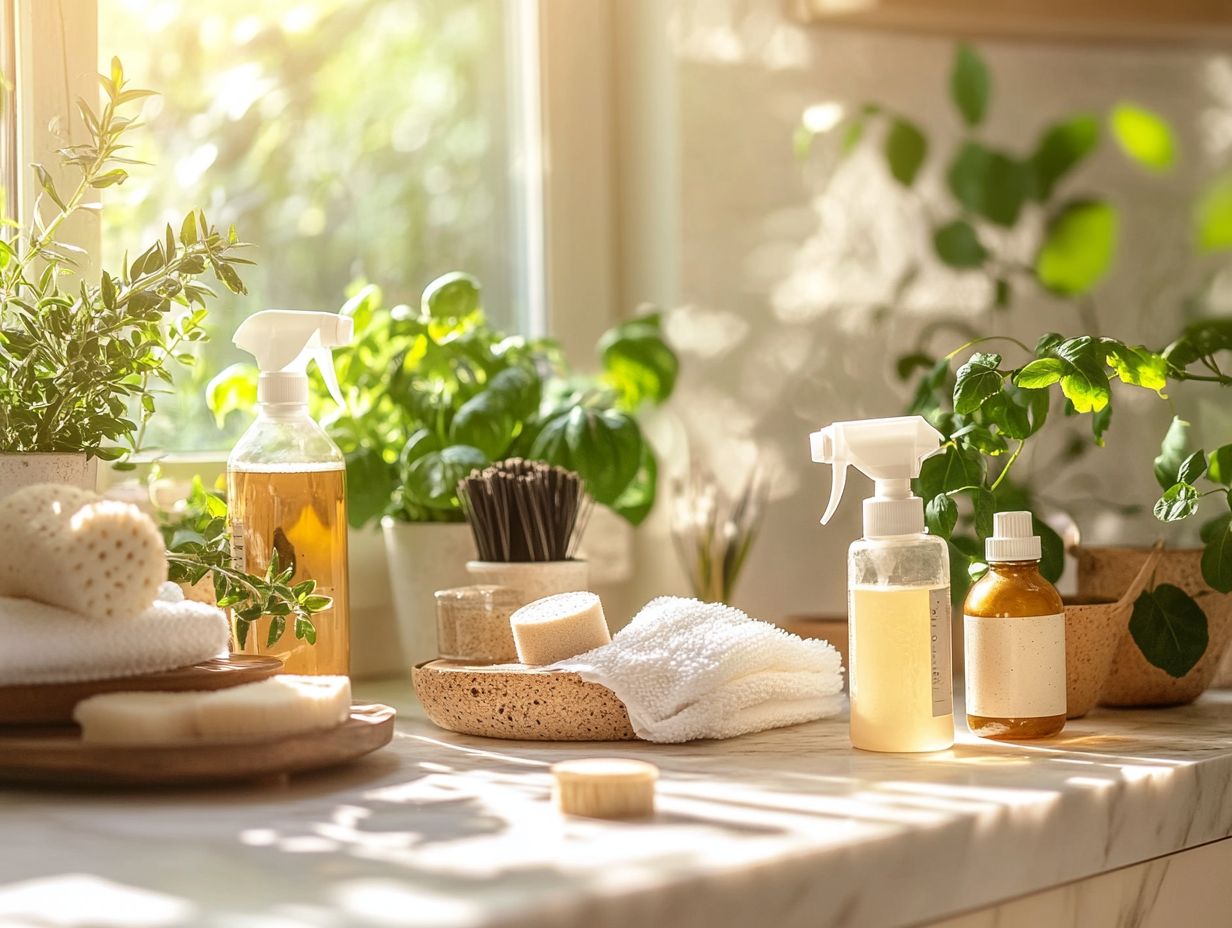
Researching a cleaning product company’s environmental practices is crucial for you as a consumer seeking eco-friendly choices. Many brands claim to be sustainable, but standards vary widely.
Look for certifications like the EPA’s Safer Choice or Design for the Environment (DfE) label. These certifications represent a real commitment to safer, environmentally friendly products.
You can also refer to resources like the National Toxicology Program or the International Agency for Research on Cancer for more information on chemical safety.
Understanding a company’s practices like sourcing biodegradable ingredients and minimizing packaging waste helps you avoid greenwashing, which refers to misleading claims that a company makes about being environmentally friendly, and support genuinely sustainable businesses.
Explore company websites for detailed information about their sustainability efforts. Reviewing customer feedback on platforms like Yelp or Trustpilot can provide insights into a brand’s environmental credibility.
Brands like Seventh Generation and Ecover stand out for their transparent operations and commitment to sustainability. They empower you to make responsible decisions for a healthier planet.
6. Consider Making Your Own Cleaning Solutions
Making your own cleaning solutions is a fun way to create eco-friendly products tailored to your needs. Brands like JAWS and Grove Co. offer helpful kits to get you started!
With just a dash of creativity and some common household items, you can effortlessly craft effective and gentle recipes. For a simple all-purpose cleaner, mix equal parts of water and vinegar in a spray bottle it s a game-changer!
You can boost cleaning power by adding oxygen bleach to your homemade solutions. For an extra touch, add drops of essential oils like tea tree or lavender for a delightful scent and enhanced properties.
For tough stains, apply a baking soda and water paste directly to the spot; scrubbing will be a breeze! Incorporating biodegradable cloths and reusable rags into your routine can significantly reduce waste.
Start embracing these easy changes today! You can maintain a pristine home while being mindful of the planet.
Why Should You Switch to Eco-Friendly Cleaning Supplies?
Switching to eco-friendly cleaning supplies protects your health and the environment. Traditional products contain harmful chemicals that can cause issues like respiratory problems and skin irritations.
Residents in California are increasingly aware of the health effects of these chemicals. By choosing eco-friendly alternatives, you can reduce your exposure and support sustainable practices.
Eco-friendly cleaning solutions use biodegradable ingredients and non-toxic formulas. They are effective at cleaning and promote a healthier home environment.
This shift improves indoor air quality and aligns you with the growing movement toward green cleaning and responsible consumerism. Nearly 70% of consumers prefer eco-friendly products for a safer home.
Conventional cleaners contribute to environmental degradation, leading to water pollution and disrupting ecosystems. They leave behind toxic residues that can linger long after use.
Choosing greener alternatives helps alleviate this burden and nurtures a healthier planet for future generations. Your actions can enhance community health and inspire businesses to adopt sustainable practices.
Companies like Supernatural and No Tox Life exemplify brands focusing on sustainability. Their commitment to eco-conscious products fosters a significant ripple effect in the movement toward eco-conscious living.
What Are the Harmful Effects of Traditional Cleaning Products?
Traditional cleaning products often harbor harmful chemicals that can jeopardize your health and the quality of your indoor air.
Take, for example, alkylphenol ethoxylates, commonly found in laundry detergents and surface cleaners. These substances can disrupt your body s endocrine functions, affecting reproductive health in ways you might not want to consider.
The National Toxicology Program and the International Agency for Research on Cancer have identified various chemicals in traditional cleaners as potential health risks. Stricter regulations are being enforced in states like California to mitigate these issues.
Many household cleaners contain artificial fragrances. While they may smell pleasant, these fragrances can trigger allergies and worsen asthma symptoms, paving the way for long-term respiratory issues.
Volatile Organic Compounds (VOCs) present in these fragrances can harm your indoor air quality. Continued exposure can lead to chronic conditions that diminish your overall quality of life.
Understanding these harmful ingredients is essential. By arming yourself with knowledge, you can make informed choices and opt for safer, eco-friendly cleaning alternatives.
Act now to choose safer products that protect your health and the environment!
What Are the Benefits of Using Eco-Friendly Cleaning Supplies?
Using eco-friendly cleaning supplies offers numerous benefits. They promote better health and reduce your environmental footprint. By choosing products that feature biodegradable ingredients and non-toxic components made from renewable resources, you can significantly reduce your exposure to harmful chemicals, potentially alleviating health concerns like allergies and asthma. These products also tend to have fewer VOCs (volatile organic compounds), which helps improve your indoor air quality.
Eco-friendly cleaning solutions focus on sustainable practices, from responsible sourcing to minimizing packaging waste. This approach enhances the safety of your cleaning routines and positively impacts the environment, making eco-friendly choices a true win-win.
Eco-friendly products are especially beneficial for homes with children and pets. They significantly lower the risk of accidental poisoning and chemical exposure. Research has demonstrated that switching to green cleaning products can enhance indoor air quality, cutting down on irritants that contribute to respiratory issues. Satisfied users often share testimonials that praise these products for their effectiveness in tackling grime and stains without compromising safety. Brands like Scrub Daddy and Meliora Cleaning Products have built their reputations on such eco-friendly offerings.
Embracing eco-friendly cleaning aligns seamlessly with broader sustainable practices, promoting responsible consumption and a commitment to preserving the planet for future generations. Ultimately, opting for these products is not just a personal health decision; it s a significant step toward nurturing a healthier environment for all.
How Can You Tell If a Product Is Truly Eco-Friendly?
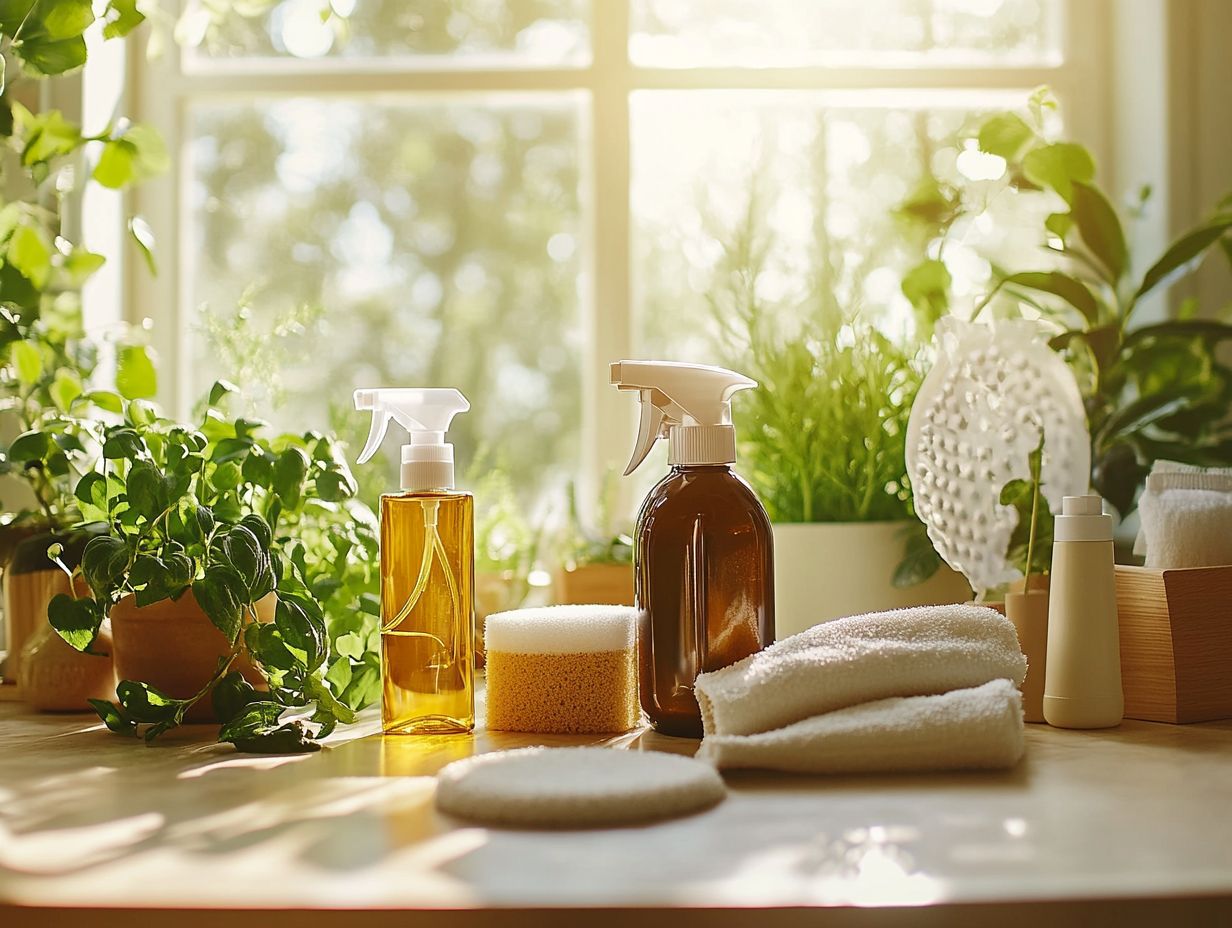
Determining whether a cleaning product is genuinely eco-friendly requires a keen eye for detail and an understanding of product labels and certifications to avoid falling prey to greenwashing claims. Authentic eco-friendly products typically bear eco-labels such as the EPA’s Safer Choice or the DfE label, signifying that they meet rigorous environmental and health standards. Seek transparency in ingredient lists and look for brands that prioritize biodegradable components and sustainable practices. By staying vigilant and well-informed, you can ensure that your choices contribute meaningfully to a healthier home and planet. Many such products are certified by MADE SAFE and 1% for the Planet, highlighting their commitment to comprehensive sustainability.
It’s essential to recognize common tricks companies might use to mislead consumers, including vague language and confusing pictures, or conveniently omitting negative aspects of their products. Terms like “natural” or “green” are often unregulated and can be used without any real substantiation. This is why it’s crucial to look for reliable eco-labels that provide verifiable assurance of a product’s sustainability.
When shopping, check for trustworthy certifications like USDA Organic, Energy Star, or Fair Trade. These labels ensure that your choices are genuinely sustainable. Notable brands, such as Seventh Generation and Ecover, distinguish themselves through their dedication to transparency and sustainability, making it simpler for you to make responsible choices.
What Are the Most Common Eco-Friendly Ingredients in Cleaning Products?
The most common eco-friendly ingredients in cleaning products often consist of biodegradable and plant-based components that effectively combat dirt and grime without harming the environment. Ingredients like vinegar, baking soda, and oxygen bleach a cleaning agent that releases oxygen for better stain removal act as powerful cleaning agents.
Essential oils not only provide delightful fragrances but also contribute natural antibacterial properties. You ll find these eco-friendly ingredients highly effective and safe, making them ideal for households mindful of chemical exposure and environmental impact. By choosing these natural alternatives, you can keep your home spotless while supporting ways to help the environment. Using recycling materials for packaging can further minimize the environmental footprint of these products.
Take vinegar, for instance. It s not just a deodorizer; it also works wonders at dissolving mineral deposits and grime on surfaces like glass and countertops. Baking soda is another star performer, excelling as a gentle abrasive that s perfect for scrubbing pots and pans or freshening up carpets.
Brands such as Seventh Generation and Method have effectively embraced these ingredients in their formulations, allowing you to achieve cleanliness without compromising your health or the planet. By opting for these cleaner choices, you reduce your exposure to harsh chemicals that can trigger allergies and respiratory issues.
This harmonious blend of health and sustainability is increasingly appealing to people who care about the environment, who are eager to make impactful choices in their everyday lives.
How Can You Make Your Own Cleaning Solutions Using Natural Ingredients?
Crafting your own cleaning solutions with natural ingredients is not only a rewarding endeavor, but it also empowers you to take charge of your cleaning! By blending everyday household staples like vinegar, baking soda, and essential oils, you can create powerful cleaners that avoid harsh chemicals and artificial fragrances.
Opting for biodegradable cloths to apply these solutions further amplifies your eco-friendly impact, minimizing packaging waste and promoting a sustainable lifestyle. Using concentrated formulas can also extend the life of your homemade cleaners, making them more efficient and environmentally friendly.
This DIY approach gives you the power while contributing to a cleaner, healthier home environment.
These homemade cleaners are gentle on the planet and help you avoid potentially harmful substances often lurking in commercial products. For instance, whipping up a multipurpose cleaner is as easy as mixing equal parts of water and vinegar, adding a few drops of tea tree or lavender essential oil for a lovely scent and added antimicrobial benefits.
Regarding glass cleaning, a simple combo of water, rubbing alcohol a common household disinfectant and a splash of vinegar yields a streak-free shine that can outshine store-bought options.
You can even prepare a straightforward homemade laundry detergent using grated Castile soap and washing soda, providing a chemical-free alternative for your clothing care. To keep these solutions fresh and effective for the long haul, store them in labeled glass containers and tuck them away in a cool, dark place.
This DIY approach also aligns with sustainable practices by minimizing packaging waste and maximizing the use of biodegradable ingredients. Embracing these practices not only helps you save money but also makes a significant dent in your carbon footprint, fostering a lifestyle that aligns beautifully with sustainable living. Brands like Seventh Generation and Ecover support this lifestyle by offering transparent, eco-friendly products.
Frequently Asked Questions
What are eco-friendly cleaning supplies?
Eco-friendly cleaning supplies are made from safe, natural ingredients. They re good for you and the planet!
Why should I choose eco-friendly cleaning supplies?
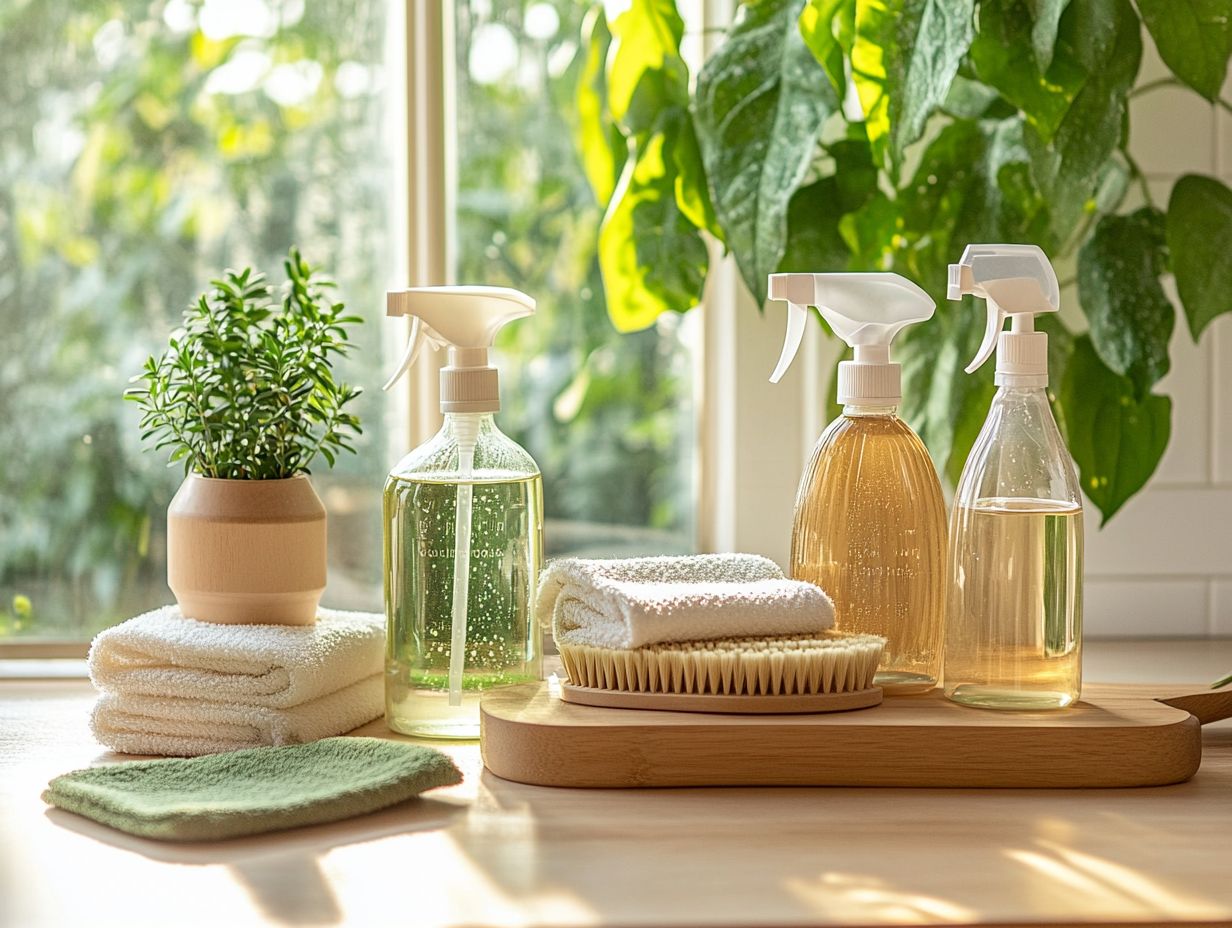
Using eco-friendly cleaning supplies is better for the environment and your health. Traditional cleaning products contain chemicals that can harm both humans and the environment, while eco-friendly options are made from natural, non-toxic ingredients, helping the environment and your health.
What are the benefits of using eco-friendly cleaning supplies?
Using eco-friendly cleaning supplies leads to better indoor air quality by reducing volatile organic compounds (VOCs) and other toxic substances. They often come in concentrated formulas, reducing the need for excessive packaging and minimizing waste.
Many eco-friendly cleaning supplies help reduce your carbon footprint, promote a healthier home environment, and protect the planet for future generations. You ll be pleased to know that many of these products are just as effective as traditional cleaning supplies, if not more so. They use biodegradable ingredients and eco-friendly methods!
How can I identify eco-friendly cleaning supplies?
Pay attention to eco-labels and certifications like MADE SAFE , 1% for the Planet, and those issued by organizations such as the National Toxicology Program and the International Agency for Research on Cancer. These can guide you toward safer, more sustainable choices.
Look for products labeled “eco-friendly,” “natural,” or “non-toxic.” Check the ingredient list for harmful chemicals, as eco-friendly cleaning supplies typically use plant-based ingredients. Third-party certifications, such as the USDA Organic label, EPA’s Safer Choice, and DfE labels, can also help you identify eco-friendly products.
What should I avoid when choosing eco-friendly cleaning supplies?
Avoid products that advertise themselves as antimicrobial without proper certification, as they may contain harmful chemicals like alkylphenol ethoxylates.
Steer clear of products containing harsh chemicals such as ammonia, chlorine, and phthalates. These substances can harm your health and the environment, affecting indoor air quality. Be cautious of products claiming to be “green” or “natural” but still containing harmful ingredients, a practice known as greenwashing.
Where can I find eco-friendly cleaning supplies?
Eco-friendly cleaning supplies can be found in most grocery stores, natural food stores, and online retailers. Brands like JAWS, Blueland, Grove Co., Supernatural, No Tox Life, Scrub Daddy, and Meliora Cleaning Products offer excellent options.
You can also make your own using household ingredients like vinegar, baking soda, and essential oils. Just be sure to do your research and read reviews to ensure the product is truly eco-friendly. Consider factors such as packaging waste and the use of renewable resources.
Start using eco-friendly supplies today for your health and the planet!

